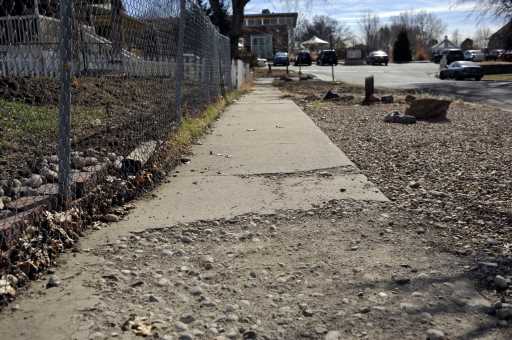Denver sidewalks ballot measure: Vote no on proposed homeowner fees
Editor’s note: This represents the opinion of The Denver Post editorial board, which is separate from the paper’s news operation.
Denver voters have the chance to fund direly needed sidewalk construction and repairs this November. But the proposal is not cheap, and it could hit some homeowners and business owners very hard, even if they have just recently repaired their sidewalks.
The proposed sidewalk fee was put on the ballot by Denver Deserves Sidewalks, an advocacy group that has been working since 2015 to get the city to build and repair a network of sidewalks in a city that is increasingly relying on pedestrian transportation.
“After seven years, we decided it was time to take it to the voters and let the voters decide whether sidewalks are, in fact, a priority for our city,” said Jill Locantore, executive director of the Denver Streets Partnership. “The initiative would publicly fund sidewalk construction and repairs citywide, which we believe would address a very basic need of Denver residents.”
Locantore is right about one thing, the city’s current system for providing sidewalk infrastructure is broken. Under the city’s existing law, property owners are responsible for the construction and repair of sidewalks in publicly owned right-of-ways that exist on their property.
Locantore quoted a Denver survey that showed 40% of Denver streets either don’t have sidewalks, or the sidewalk is too narrow or otherwise not functional. In addition to missing segments, some sidewalks are unpassable because of disrepair.
Homeowners now can be forced by the city to repair or install sidewalks, but the actual enforcement of existing law is so ad-hoc as to be almost non-existent, she said.
The city has set aside funding in recent bond issues to build and repair sidewalks, but at the current pace of the city’s efforts, Locantore calculates it will take centuries to finish out a complete network of sidewalks.
Under the Denver Deserves Sidewalks program, a fee would be imposed annually on property owners based on the linear feet of existing or missing sidewalks on their property. Locantore says the typical single-family lot in Denver has 50 linear feet of sidewalks and would pay the residential street fee of $2.15 per linear foot, which would come out to about $107 a year. Many lots in more suburban Denver neighborhoods are larger and would pay more.
Meanwhile, properties on parkways would pay $2.87 per linear foot and those on arterial roads would pay $3.58 per linear foot. Downtown property owners and those on main streets considered arterials would pay $4.30 per linear foot.
Our concern is that some select homeowners could be hit very hard by this annual fee which is incredibly regressive. The owner of a brand-new multi-million dollar home could, in many cases, pay a third of what a nearby 70-year-old house half the size and half the value would pay if the house were on a corner lot with a parkway or arterial road on two sides. Also, residents in high-rise buildings would pay only a fraction of what single-family homeowners pay despite arguably needing and using the sidewalk infrastructure more frequently.
Lacontore’s group has taken steps to soften the impact of the fee – historically low-income neighborhoods identified through the city’s Neighborhood Equity and Stabilization program (like East Colfax, Elyria-Swansea, Globeville, Montbello, Sun Valley and Westwood) would get a 20% discount, and homeowners would be able to defer payment until the time a house is sold.
We want a safe and functional network of sidewalks in this city; however, the threshold for our support of special taxes or fees brought by groups outside of the city council is extremely high. There is a real danger to the city from special interest tax proposals that tie up revenue outside of the general operating budget of the city. The execution of such measures must be flawless.
We see too many flaws in the Denver Deserves Sidewalks proposals to support it at this time.
To send a letter to the editor about this article, submit online or check out our guidelines for how to submit by email or mail.
Source: Read Full Article




